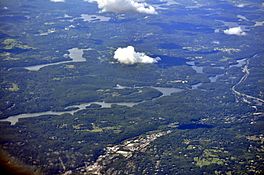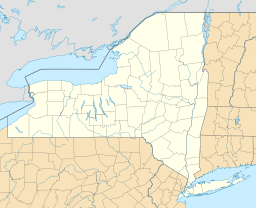Amawalk Reservoir facts for kids
Quick facts for kids Amawalk Reservoir |
|
|---|---|

Amawalk Reservoir can be seen at left center of this 2013 aerial photograph of nearby Muscoot Reservoir. Amawalk Reservoir is immediately left of the cloud at center.
|
|
| Location | Westchester County, New York |
| Coordinates | 41°18′15″N 73°44′20″W / 41.30417°N 73.73889°W |
| Type | reservoir |
| Catchment area | 20 sq mi (52 km2) |
| Basin countries | United States |
| Max. length | 3 mi (4.8 km) |
| Surface area | 579 acres (2.34 km2) |
| Average depth | 36 feet (11 m) |
| Max. depth | 60 feet (18 m) |
| Water volume | 6.7 billion gallons (25,000,000 m3) |
The Amawalk Reservoir is a special lake in Westchester County, New York. It's part of the big system that brings drinking water to New York City. This reservoir is located where two main roads, U.S. Route 202 and New York State Route 35, meet in the town of Somers. It's about 32 miles (51 kilometers) north of New York City.
What is the Amawalk Reservoir?
This reservoir is like a large, man-made lake that holds water. It was created by building a dam across the middle part of the Muscoot River. The Muscoot River is one of the smaller streams that flow into the Croton River. The Amawalk Reservoir started working in 1897. It was named after a small community called Amawalk, which used to be in the area. That community had to move to a new spot near the dam when the reservoir was built.
Size and Capacity
The Amawalk Reservoir is one of the smaller reservoirs in New York City's water system.
- It is about 3 miles (4.8 kilometers) long.
- When it's completely full, it can hold about 6.7 billion gallons (25.4 billion liters) of water.
- The area that collects rainwater for the reservoir, called its drainage basin, is about 20 square miles (32 square kilometers).
How Water Flows from Amawalk
Water from the Amawalk Reservoir plays an important role in supplying drinking water.
- Water that leaves the Amawalk Reservoir flows south into the Muscoot River.
- This water then enters the Muscoot Reservoir.
- From there, it flows into the New Croton Reservoir.
- Next, the water enters the New Croton Aqueduct. An aqueduct is like a giant pipe or channel that carries water over long distances.
- The aqueduct sends water to the Jerome Park Reservoir in the Bronx.
- From Jerome Park, the water is then sent to homes and businesses in the Bronx and northern Manhattan.
- On average, the New Croton Aqueduct provides about 10% of all the drinking water for New York City.
- Any water that doesn't go into the New Croton Aqueduct eventually flows into the Hudson River at a place called Croton Point.



